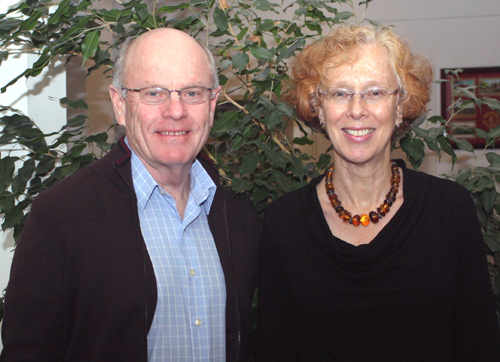
How would you solve this problem? In large areas across South Asia people no longer grow and eat millet seeds, but favour less nutritious rice. And it’s affecting their health.
There are numerous reasons for this switch; far beyond crop production, markets, processing, gender and other factors play a role. “Certainly the fact that women find it harder to process millets than rice has had a big impact on production,” says sociology and anthropology professor Sally Humphries, who is also director of international development studies at U of G. “Understanding the role of gender relations in agricultural production is a key issue. There has to be a healthy dose of social science in any agricultural development project.”
Humphries says this university may be the best place to mix together the various doses of hard and soft science that help to improve outcomes in international health programs that affect people, animals and the environment. “The U of G is unique in the way it integrates different fields. Because we have OAC and OVC, as well as the more standard university departments, we have greater opportunities to think outside of our disciplines and work collaboratively in a big way.”
She adds: “You don’t solve problems by being narrowly focused.”
It’s normal for Humphries to work with people in other fields. Right now, she’s co-supervising doctoral students who are involved in a food security project in India, Nepal and Sri Lanka; the team on that project includes graduate students in food science, population medicine, plant science and integrative biology as well as international development studies. By combining knowledge and skills from these various fields, she says her students are able to make a much bigger contribution to the health of the entire community.
Guelph grad Roger Thomson, DVM ’75, who owned a veterinary practice in Kincardine, Ont., says his international involvement started in a simple way. “I wanted to donate my old copies of veterinary journals rather than just throwing them out.” He was given the name of Prof. Uswege Minga of The Open University of Tanzania and ultimately travelled there to meet him; the men are now close friends.
Thomson’s purpose in Tanzania was to help a fellow veterinarian, but when they visited the village where Minga had grown up, Thomson saw that 90 of the 250 children at the local primary school had no desks. He made a commitment to fund desks for the school.
“Later, some of the students with OVC’s Global Vets program visited the village and pointed out that 20 per cent of the children in the secondary school were orphaned because their parents had died of HIV/AIDS,” says Thomson. “We started a project at the school so the students could learn to raise chickens, with the hope of selling the eggs and raising money to help the orphans.” Recently, students working for Veterinarians without Borders/Vétérinaires sans Frontières – Canada (VWB/VSF) set up classes for local farmers to teach them how to improve the health of their chickens.
When Thomson first visited the village in 2003, none of the elementary school children who were eligible to take the secondary school entrance exam were able to pass it. Now more than 70 per cent pass each year.
Thomson, who has been active with VWB/VSF since it was founded, says people think Vets Without Borders is just about animals. “But you can’t go into a village in a developing country like Tanzania without becoming involved in public health and environmental health as well. It’s all one.”
That’s the message Thomson, Humphries and others are hoping to build on at the Global Development Symposium to be held on campus May 6 to 9, hosted by the Ontario Veterinary College. The symposium is entitled Critical Links Between Human and Animal Health and has three themes: global public health, food security and health, and empowering communities for change.
Thomson says, “You could not have a better list of keynote speakers,” naming Stephen Lewis, former special U.N. envoy for HIV/AIDS and board chair of the Stephen Lewis Foundation in Canada; OVC grad Brian Evans, executive vice-president of the Canadian Food Inspection Agency; Dr. David Butler-Jones, who heads the Public Health Agency of Canada; OVC grad John McDermott, director of the Consultative Group for International Agricultural Research; and U of G president Alastair Summerlee.
Abstracts for the symposium are being accepted until Feb. 6. See www.gds2012.ca for information.
“We are looking for papers in any area around community development, food security, health, and how people have gone about achieving some of those goals,” says Humphries. While the event is being held at OVC and is part of the college’s 150th-anniversary celebrations, it is intended to include all disciplines. Humphries sees this event as a valuable opportunity to bring together researchers and others interested in these issues, from a variety of academic fields: “We need to think outside of our disciplines and work more collaboratively. It’s all interconnected.”